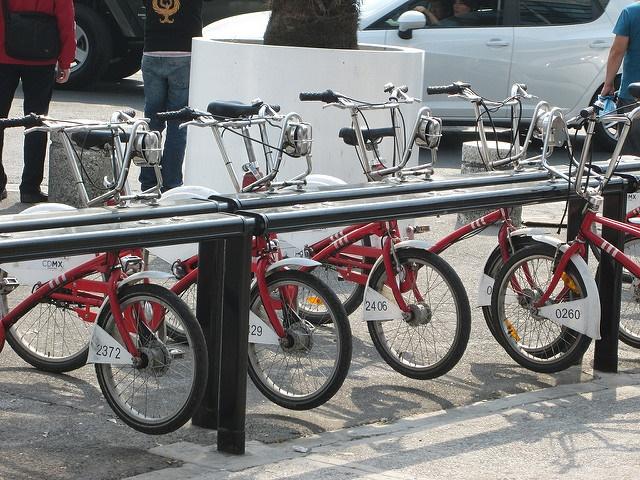- News
- Reviews
- Bikes
- Components
- Bar tape & grips
- Bottom brackets
- Brake & gear cables
- Brake & STI levers
- Brake pads & spares
- Brakes
- Cassettes & freewheels
- Chains
- Chainsets & chainrings
- Derailleurs - front
- Derailleurs - rear
- Forks
- Gear levers & shifters
- Groupsets
- Handlebars & extensions
- Headsets
- Hubs
- Inner tubes
- Pedals
- Quick releases & skewers
- Saddles
- Seatposts
- Stems
- Wheels
- Tyres
- Tubeless valves
- Accessories
- Accessories - misc
- Computer mounts
- Bags
- Bar ends
- Bike bags & cases
- Bottle cages
- Bottles
- Cameras
- Car racks
- Child seats
- Computers
- Glasses
- GPS units
- Helmets
- Lights - front
- Lights - rear
- Lights - sets
- Locks
- Mirrors
- Mudguards
- Racks
- Pumps & CO2 inflators
- Puncture kits
- Reflectives
- Smart watches
- Stands and racks
- Trailers
- Clothing
- Health, fitness and nutrition
- Tools and workshop
- Miscellaneous
- Buyers Guides
- Features
- Forum
- Recommends
- Podcast
 Bike share, Mexico City (CC licensed by Design for Health via Flickr).jpg
Bike share, Mexico City (CC licensed by Design for Health via Flickr).jpgBikes were fastest way to deliver medical supplies in wake of Mexico earthquake
In the days after last month’s earthquake, over 1,000 cyclists linked up to deliver medical equipment, tarpaulins and food around Mexico City. The city’s unofficial ‘bicycle mayor’ now wants to double the number of daily bike trips to 280,000 by 2019 to combat what is thought to be the world’s worst congestion.
TomTom has ranked Mexico City as the most congested in the world and navigating the city only became more difficult on September 19 when a magnitude 7.1 quake struck.
Reuters reports that Areli Carreón had recently been named the city’s unofficial bicycle mayor as part of a scheme set up by Amsterdam-based advocacy group CycleSpace. Following the earthquake, events to publicise her appointment were postponed – but the usefulness of bikes came to the fore nevertheless.
“At the city’s worst moment, we were there and able to provide mobility when nothing else – not even emergency vehicles – was moving around,” explained Carreón.
Immediately after the disaster, cyclists helped locate collapsed buildings where people might be trapped, and ferried medicine and supplies to rescue teams. Carreón used maps of quake damage, directing riders via walkie-talkie style apps.
The ECOBICI bike-sharing scheme, which has 250,000 registered users, also made its 6,000 bikes available for free.
“In the first few hours, the only thing that was moving around was bicycles. They really served as an emergency breathing system for the city,” said Carreón.
“No matter the distance, no matter the place, no matter how bad the road was, how difficult the traffic, bicycles with their cargo were the fastest possible way.”
Her aim now is to turn the city towards cycling for the long-term.
“We need to make sure there’s a place for cycling, not only in emergencies but every day for everybody to get everywhere.”
An average of 26 cyclist deaths are reported each year. Carreón wants to cut this and double the the amount of bike lanes to 340km.
“We need to do this because of congestion - we need to move people around because we’re losing a lot of time and money,” she said.
Alex has written for more cricket publications than the rest of the road.cc team combined. Despite the apparent evidence of this picture, he doesn't especially like cake.
I have known more than one elder statesman of the club die of a heart failure while out on a ride. Sometimes I feel that's about to happen to me,...
Via the "wireless active steering system".
It does say "so-called reciprocol" to be fair. But I agree, Trump calling the tariffs reciprocol is disingenuous at best, given that they are based...
137m is the farthest I have observed when quickly looking at the Garmin unit....
Yours worked wonders, but if you insist, I'll hop to it...why the need for extra police? Did the fire brigade bottle it?
As if Tadej Pogacar's slavery-supporting jersey is any different...
Do you mean this woman, who got out to marshall the truck through and is now walking back to said Wankpanzer which is blocking the road again as it...
YUP!...
He is up against the global trading system, which has obviously been in the news a lot lately. Framebuilders in other countries can undercut him,...
Some kind of lens cleaner apparently